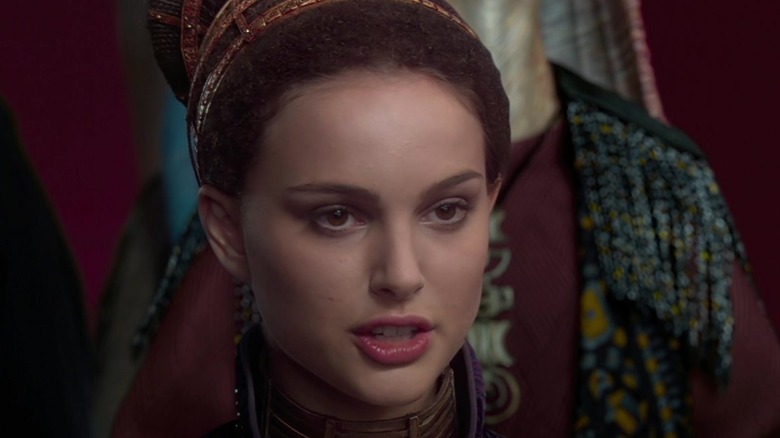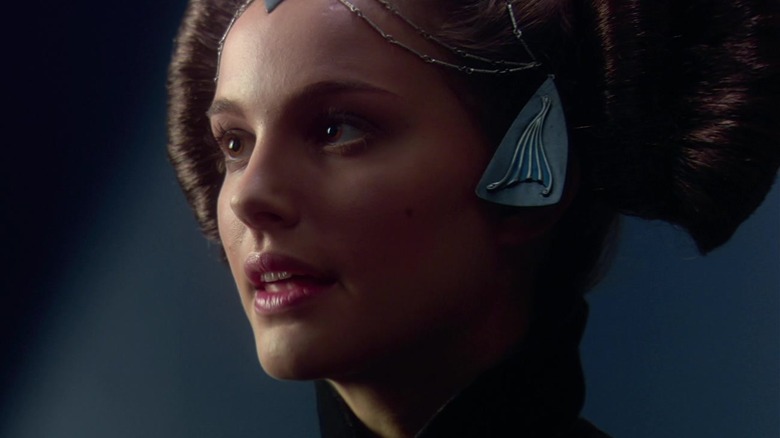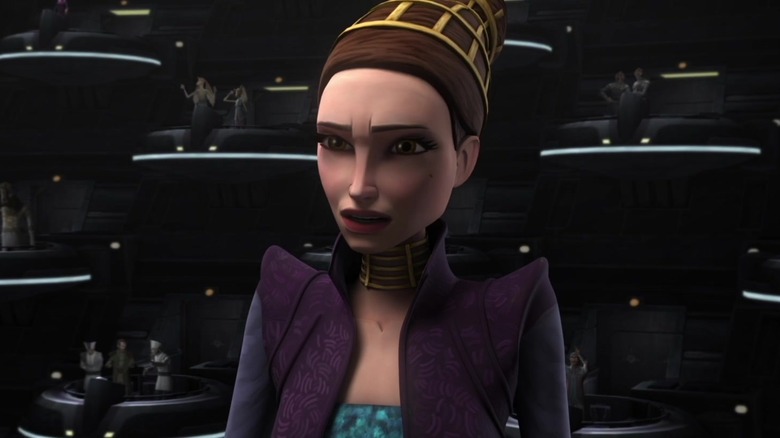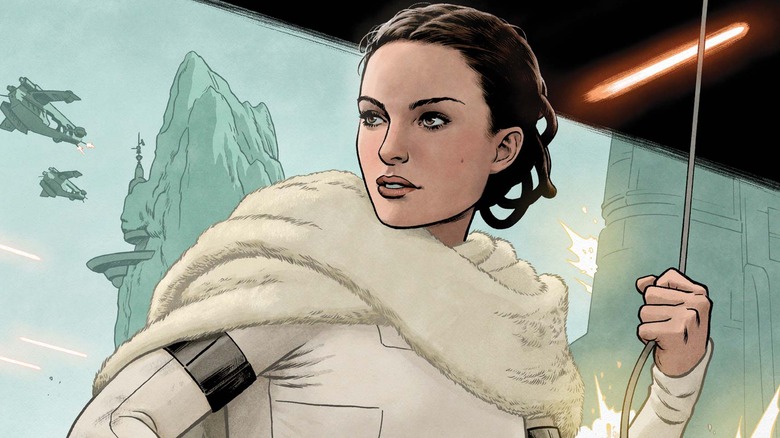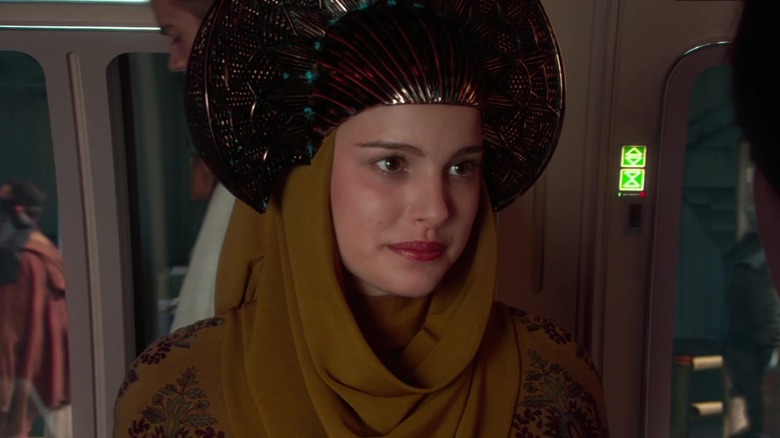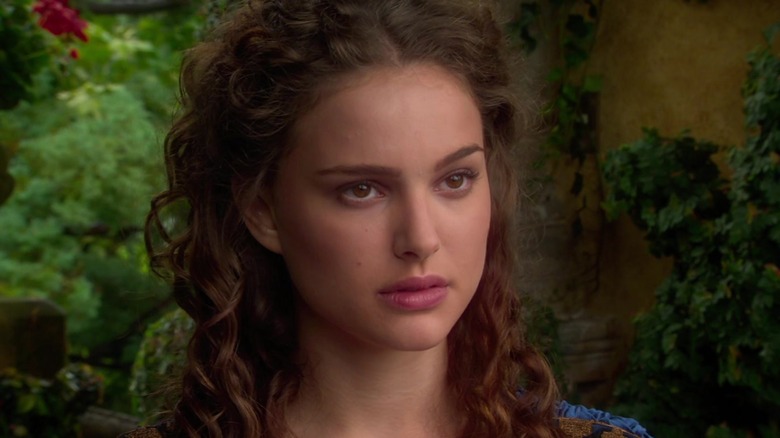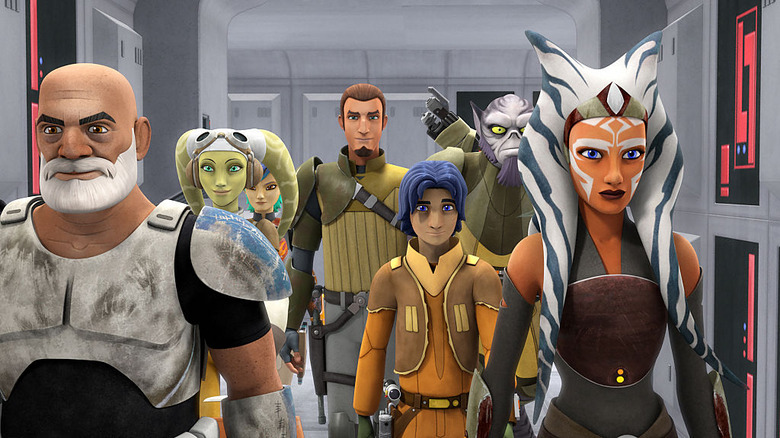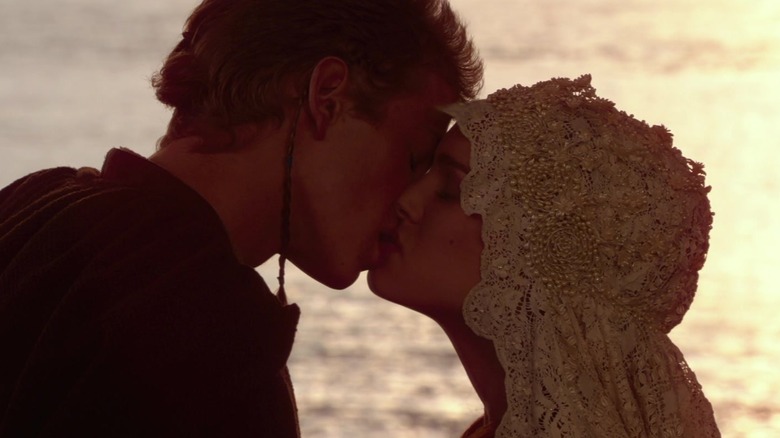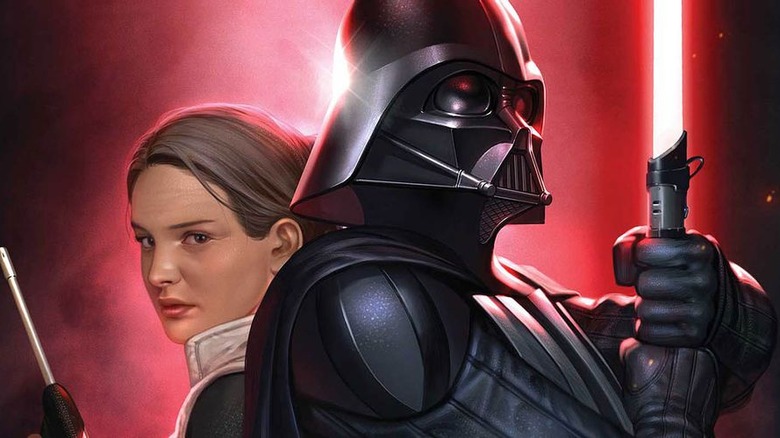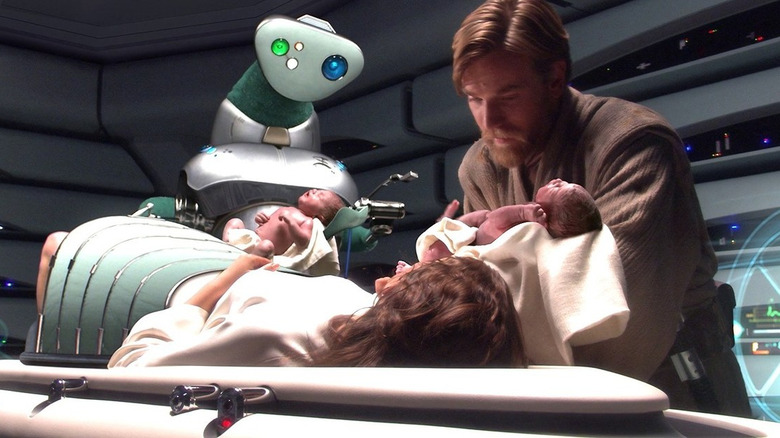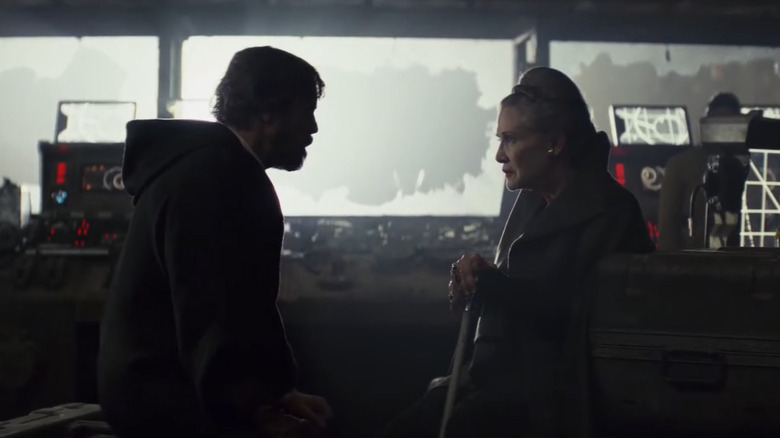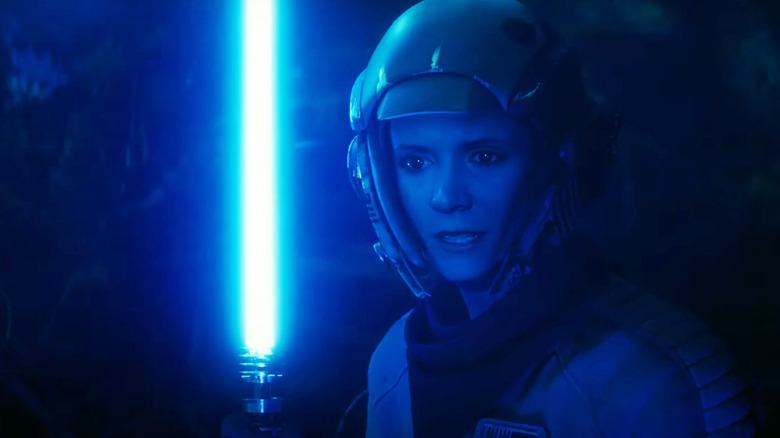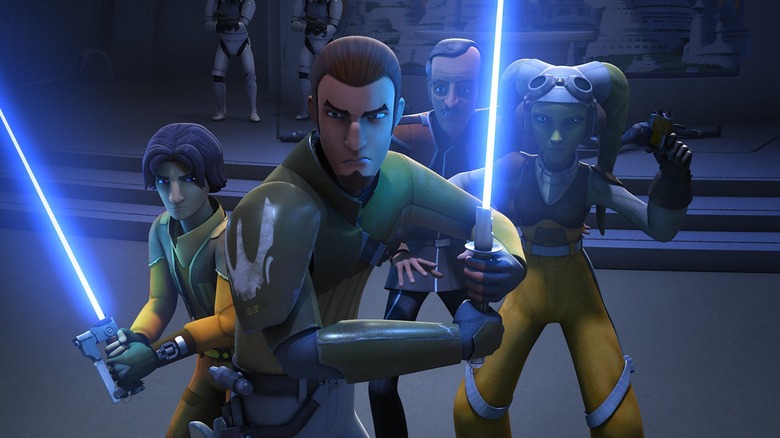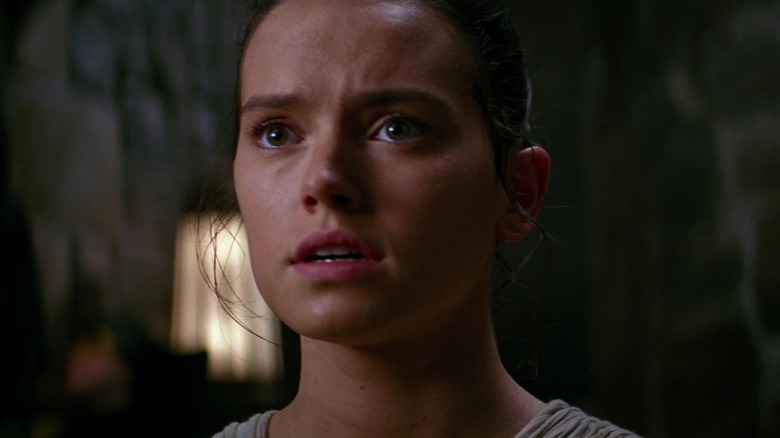What If Padme Amidala Hadn't Died In Star Wars?
"Star Wars" offers a vast array of significant, popular, and interesting characters to love. Padmé Amidala, queen and senator of Naboo, civil rights activist, and ardent advocate of democracy is one of the best.
One of the youngest senators of the Republic, she is often underestimated by her political opponents. But with her shrewd intelligence and proficient espionage and combat skills, Padmé soon proves herself a force to be reckoned with. In "Star Wars: Episode II — Attack of the Clones" and multiple episodes of "Star Wars: The Clone Wars," Padmé thwarts multiple Separatist plots, unknowingly hinders Palpatine's plan to overthrow the Republic, and exposes corruption throughout the galaxy.
In contrast to these strong outings, "Star Wars: Episode III — Revenge of the Sith" disappoints many fans with its passive portrayal of Padmé. She only appears in the first act to announce that she's pregnant, sits and watches as democracy burns in the second, and unceremoniously dies in the third. The fact that one of the most strong-willed and courageous "Star Wars" characters dies because she "lacks the will to live" feels like a betrayal to many viewers. But what might "Star Wars" look like if Padmé hadn't died? We're here to explore the multifaceted answer to that thought-provoking question.
Padmé would have started the Rebellion
To start with, if Padmé had survived, she would almost certainly have become one of the Rebel Alliance's primary founders. This is so likely, in fact, that it's already nearly canon, thanks to three deleted scenes from "Revenge of the Sith." In these scenes, Padmé meets with multiple senators, including future Rebel leaders Bail Organa and Mon Mothma, to form the "Delegation of 2000," a coalition of senators who oppose Supreme Chancellor Palpatine's continued acquisition of imperial powers. The "Seeds of Rebellion" scene, which is available on Disney+, captures their first meeting, during which Padmé opposes the idea of taking action that could lead to another war. After Palpatine officially overthrows the Republic and declares himself emperor, however, she seems to change her mind.
In the two additional scenes, which are included in the movie's novelization, Padmé urges the Delegation to take a different approach. Instead of openly defying the Emperor in the Senate, she proposes they pretend to approve of the Empire, while secretly playing the long game as they slowly foment rebellion against Palpatine's rule.
Padmé wouldn't have returned to the Senate
If Padmé had survived, she definitely would have become one of the Rebellion's founders. It's just as certain that she wouldn't have acted as one of the Rebellion's secret allies in the Senate. How can we be so sure? Because we know that if Padmé hadn't died in childbirth, Palpatine asbolutely would have attempted to assassinate her.
Throughout the prequels, Padmé is frequently the single most significant obstacle to the would-be Emperor's schemes. In "Star Wars: Episode 1 — The Phantom Menace," her escape is the sole reason that his plans for Naboo fall apart. Then, in "Attack of the Clones," Padmé's opposition to creating an official army of the Republic is so effective that he orders her assassination. Similarly, in "Star Wars: The Clone Wars," Padmé gets so close to brokering peace with the Separatists in "Heroes on Both Sides" that Count Dooku has to personally murder her main ally in his own Senate.
If Padmé had survived, she'd know who and what Palpatine really is, which means she'd know better than to return to the Senate. Instead, she likely would have chosen to work from the shadows.
Padmé would have been the Empire's Public Enemy Number 1
Since she wouldn't have been able act as a Rebel leader within the Senate, a famous and renowned Republic leader like Padmé would have been the perfect choice to become the figurehead for the Rebellion. This means that if Padmé had survived, she would have become Public Enemy Number One to the Empire.
As a well-spoken and charismatic woman with a long history of defending democracy and opposing the Clone Wars that allowed Palpatine to destroy the Republic, Padmé would have provided the early Rebellion with a lot of credibility. This means that when they finally began calling themselves the Alliance to Restore the Republic, many would have more easily believed it.
Padmé's multiplicity of skills would have also made her a prominent enemy of the Empire. Whether she needed to outfight stormtroopers, plan clever strategies to evade the Empire and sabotage its war machines, or use her words to inspire the citizens of the galaxy to rebel against tyranny, Padmé' would have had the know-how the Rebellion needed in its leaders, especially in its infancy. While the Delegation of 2000 operated in secret within the Emperor's own senate, Padmé could have been on the front lines, fighting the good fight and openly speaking out against the Empire and its many evils.
The Rebellion could have ended up doubling as investigative journalists under Padmé's leadership
Padmé is a woman of many talents, but she relies on one skill above all others: her words. She clearly knows how to fight, but her first strategy is always to speak with people openly and truthfully. Every time she actually poses a threat to Palpatine's plans, she's giving a speech that encourages people to deescalate the war and search for peace instead.
Palpatine's plan to overthrow the Republic doesn't rely on a grand army, or even the Force. It relies on words that slowly erode the Republic's democracy until it finally becomes his Empire. On this sort of stage, Padmé is his only real opponent. Had Padmé survived, she would surely have recognized and taken advantage of this. As tyranny's most dangerous enemy is truth, a fact Padmé knows well, the infant Rebellion would probably have looked more like a collection of investigative journalists than soldiers.
In its early days, the Rebellion simply wasn't capable of challenging the Empire in combat. But if Padmé had been around, the Rebellion would've been busy broadcasting the Empire's many atrocities while it gathered its allies and grew its strength. The more people Padmé could have convinced to rebel, the more the Rebellion could have grown. Given enough time, this could have struck a major blow against the Empire.
Naboo's military would have held a prominent place in Padmé's Rebel Alliance
With Padmé's open involvement, the early Rebellion would have had access to a very significant resource: the Royal Naboo Security Force. Seen throughout "The Phantom Menace," Naboo's military is small, but quite effective. Its Royal Space Fighter Corps features top-of-the-line starfighters like the N-1, which definitely could have come in handy. Moreover, its Palace and Security Guards would have performed quite well as the first Rebel fighters. Beyond this, many Naboo soldiers already have experience rebelling, from when they organized the Naboo resistance against the illegal droid occupation in "The Phantom Menace." If they managed to escape the planet with most or all of their equipment, they would doubtlessly have proved to be an excellent paramilitary force, able to train Rebellion recruits.
These experienced soldiers and veteran pilots would have been more than equipped to pull off small strikes against Imperial infrastructure, or hit-and-runs on military convoys. Similarly, larger ships like the J-type 327 Nubian starship, seen in "The Phantom Menace," could have worked excellently as blockade runners capable of racing people past Imperial checkpoints. Couple this with Padmé's many handmaiden lookalikes, and she could have easily operated as the Rebellion's public figurehead while still evading the Emperor's wrath.
If nothing else, it's fun to imagine Leia fleeing Vader's star destroyer in a royal cruiser, or Luke performing the trench run in a yellow-and-silver Naboo starfighter instead of an X-wing.
Padmé and Ahsoka Tano would have remained constant companions
A surviving Padmé Amidala would have had an important ace up her sleeve: Ahsoka Tano, the former Jedi Padmé grows close to in "The Clone Wars." They first meet while infected with the deadly Blue Shadow Virus in "Mystery of a Thousand Moons." They keep each other's spirits up while they wait for a cure, forming the foundation of a long-lasting friendship. Padmé learns to trust Ahsoka in "Assassin" when the Padawan's visions of the future allow her to save Padmé from yet another assassination attempt. Likewise, Ahsoka learns to trust Padmé in "The Wrong Jedi" after the senator defends her at a military trial after she's framed for terrorism. This friendship would surely have survived the fall of the Republic and the Jedi Order.
Much of E. K. Johnston's canonical novel, "Star Wars: Ahsoka," involves the former Jedi figuring out if she can trust Bail Organa enough to join his Rebellion. If Padmé had been around, however, this wouldn't have been a question at all. Ahsoka would likely have been with her from the start. A trained military force, a Jedi, and a competent, charismatic leader would have been an excellent foundation on which to build a Rebel Alliance.
The many Rebel cells would have unified more quickly
One of the first overarching plots of "Star Wars Rebels" involves the unification of the Rebel Alliance. Though a multitude of people begin rebelling as soon as the Empire is formed, they're all operating independently as separate rebel cells. It isn't until the show's Season 1 finale, "Fire Across the Galaxy," that they finally begin to operate in concert, after Bail Organa sends Phoenix Squadron to save the crew of the Ghost.
These events take place 15 years after the formation of the Empire. It takes over a decade for an organized coalition of Rebel cells to become strong enough to challenge the Empire openly as the Rebel Alliance to Restore the Republic. With Padmé Amidala in play, however, this likely wouldn't have taken nearly as long.
In canon, the early Rebellion has to operate as separate cells because their primary leaders are still Imperial senators. They don't have a public, unifying leader to rally behind until much later. But if Padmé had been around to fill that role from the moment the Empire was born, she could have started that unification process 15 years early. With her charisma and credibility, planets like Mon Calamari, the main source of the Rebellion's capital ships, might have thrown in with the Rebellion years before they did in canon. The Rebellion could have also attracted more recruits and defectors far sooner, and in far greater numbers.
Anakin might not have fallen to the dark side if Padmé had survived
The biggest unknown in this "What if?" scenario is the fate of Anakin Skywalker. Padmé dies because she simply (and infamously) "loses the will to live," in light of Anakin's descent into darkness. If Padmé had survived, however, that means something must have happened to keep her from falling into despair. This Padmé might never have been attacked by Anakin in the first place, or perhaps something occurred after that fateful act to keep her hope alive. Whatever the reason, one thing is clear: If Padmé had delivered Luke and Leia and lived to tell the tale, Anakin's story would have looked very different.
Had Padmé survived, Anakin might have rejected the dark side sooner. He might never have fallen to it in the first place, in fact, if this version of events assumes he never becomes capable of Force-choking his wife. If Palpatine still managed to crown himself Emperor, the couple could have even founded the Rebellion together as husband and wife, with their children at their side.
Darth Vader might have become an even darker character if Padmé had lived
Even if Padmé had survived after delivering her healthy twins, Anakin Skywalker could still have already become Darth Vader. But since his fall to the dark side is primarily motivated by his desire to save his wife, he might have rejected both the Emperor and the dark side a whole lot sooner if he'd had the opportunity to join Padmé elsewhere. He might have even seen her survival as evidence that his visions were somehow manipulated by Palpatine. All of this could have spurred Vader's return to the light side many years before it actually happens in canon.
On the other hand, if Padmé had left the delivery room alive, Vader might have realized that all the evil he committed to save her was for nothing. He murdered children – it's difficult to imagine him being able to live with that. Thus, Padmé's survival could have pushed Vader into embracing the darkness even more fully, in order to avoid extreme guilt. Vader consistently speaks of Anakin as if he were an entirely different person, after all — the revelation that his fall to the dark side was unnecessary could have encouraged such a fiction as well.
Luke and Leia would probably still have been hidden away
Having survived childbirth one way or another, Padmé would have had the opportunity to raise her two beautiful children. Unfortunately, it's almost certain that she would have made the same decision that Bail Organa, Yoda, and Obi-Wan Kenobi make in canon: She would have sent them into hiding.
Whether Anakin fell to the dark side or stayed with the light, Luke and Leia would still be safest if they were kept away from their parents. This Padmé would probably have become involved in forming, organizing, and openly leading the Rebellion, which means her children would have been in constant danger. This wouldn't have changed if Anakin were fighting alongside her. If he weren't, it would become even more important to keep the twins' existence and location a secret from their monster of a father.
There's just no escaping the fact that Padmé's children would have become a major Imperial target, given their mother's prominence. Padmé would have known this, and sent them into hiding while she made the galaxy a better place.
Padmé's children would have been able to meet her
Even though Padmé's survival would have necessitated separation from her children, it still would have allowed Luke and Leia to meet their mother eventually. It wouldn't be easy — these kids could have definitely been raised to believe their parents were both dead, just as they are in canon. But it's still an alternative their canon selves absolutely would have chosen, if they'd been given the chance.
It's more difficult to determine when they might have actually been able to reunite. Though Luke would still be pretty isolated from the events of the galaxy, Leia would have definitely known about Padmé Amidala. She wouldn't have had any reason to suspect the woman was her mother, granted, but as well-educated royalty and a member of the Rebellion, she would definitely know the name and face of her leader. Honestly, Padmé would probably have been Leia's personal hero.
Padmé likely would have avoided ever meeting Leia and Luke in person, to avoid making them a target. This means that she probably wouldn't have revealed herself to them until they'd become targets of the Empire anyway. Because of this, Padmé likely would have revealed herself to her children after the events of "A New Hope." At that point, the pair were already some of the most wanted Rebel agents in the galaxy.
Leia and Luke may have trained as Jedi together
Despite the fact that Luke and Leia share the same powerful Skywalker blood, only Luke is trained in the ways of the Jedi during the original trilogy. From an in-universe perspective, this is largely due to the fact that by the time Luke is training to be a Jedi, nobody alive knows Leia is his sister and could be trained as well. Padmé is dead, Vader doesn't know she exists, Bail and Breha Organa are long gone, along with their planet, and Obi-Wan Kenobi is a Force ghost who seems determined to say nothing about it. Yoda knows, but he has no way of contacting anybody until after Luke has arrived on Dagobah. By that point, Leia is already lightyears away.
If Padmé had survived, however, all of that could have changed. By the time Leia and Luke became publicly-known heroes at the end of "A New Hope," Padmé would have been able to reveal herself to them. With that revelation, Leia would have learned that she could become a Jedi too. With this knowledge, it's easy to imagine that Luke and Leia might have gone on to Dagobah together, to be trained in the ways of the Jedi by Master Yoda.
More Jedi could have survived if Padmé had lived
Though Padmé isn't in a position to save any additional Jedi when Order 66 is first issued, it's likely that her influence and presence could have saved many Jedi who died, or were lost in the two decades of conflict that ensued. As a vocal supporter of the Jedi and an open rebel against the Empire, an innovative, well-equipped leader like Padmé could have provided a trusted route to safety for hunted Jedi. Even if that didn't work out, having a more organized, unified, and powerful Rebel Alliance years earlier could have meant the difference between life and death for many Jedi who came later.
Kanan and Ezra from "Star Wars Rebels," for example, may have been able to free Lothal from Imperial control without sacrificing themselves in the process, had Padmé survived. With more Rebel support, Hera's rescue may not have resulted in Kanan's death, and Ezra may not have had to rely on space whales to defeat Grand Admiral Thrawn. It's impossible to know for sure, but her influence could have proved to be enough that her children wouldn't have been the last of the Jedi by the time the original trilogy came to an end.
The sequel trilogy may never have happened if Padmé had lived
One of the most important events leading up to the sequel trilogy is the New Republic's decision to ignore the First Order's tyranny. Hoping to avoid galactic war, the New Republic does nothing, prompting Leia Organa to resign, form the Resistance, and become a general. This inaction ultimately allows the First Order to destroy the entire New Republic government with Starkiller Base in "The Force Awakens." But if Padmé had survived, things might have turned out differently.
The further out from "Revenge of the Sith" one gets, the harder it is to predict how Padmé Amidala's survival could have changed the future, especially after the Empire falls. In a perfect world, a senator of the Old Republic and the long-serving leader of the Rebel Alliance would have played a key role in the formation of the New Republic. Padmé could have become its first Chancellor, helped draft its constitution, or worked as a leading senator once again. She might have done all three, in fact.
Though an 80-year-old Padmé would likely no longer be an active figure on the galactic stage, it's possible that her influence on the New Republic could have been enough to encourage them to stand up to the First Order. This could have saved the New Republic, and an untold number of lives.
